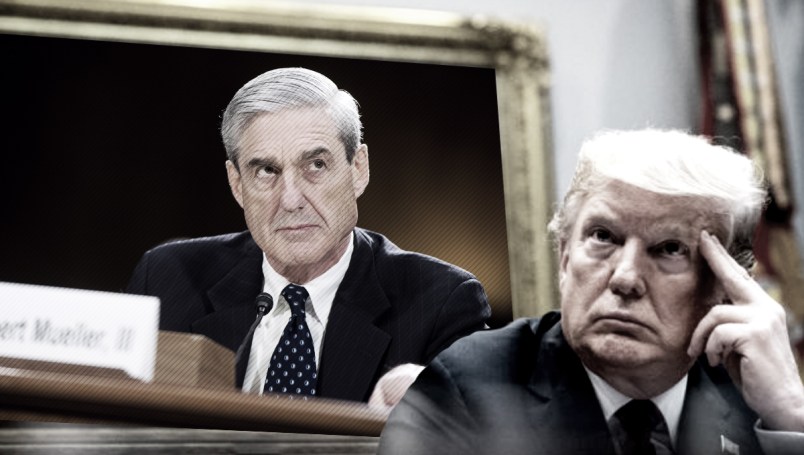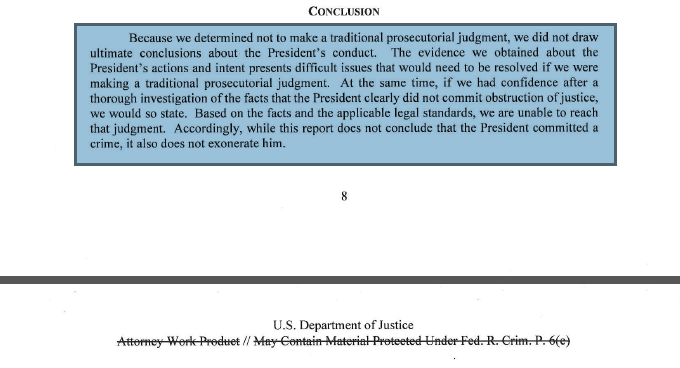Special counsel Robert Mueller’s investigation did not establish that the Trump campaign and the Russian government worked together for the President’s victory in 2016, a redacted version of the Mueller report states.
The special counsel wrote that while the Russian government recognized that it stood to gain from a Trump presidency, and while the Trump campaign understood that it would benefit from the Russian interference campaign, it could not find evidence establishing a conspiracy between the two.
“Although the investigation established that the Russian government perceived it would benefit from a Trump presidency and worked to secure that outcome, and that the campaign expected it would benefit electorally from information stolen and released through Russian efforts, the investigation did not establish that members of the Trump campaign conspired or coordinated with the Russian government in its election interference activities,” the report reads.
Yet, Mueller’s redacted report also notes that the investigation was “materially impaired” by witnesses lying, invoking their Fifth Amendment rights, and perhaps most notably, by witnesses deleting emails or using encryption apps, preventing the Mueller team from reviewing all communications. Because of this, the Mueller team “was not able to corroborate witness statements through comparison to contemporaneous communications or fully question witnesses about statements that appeared inconsistent with other known facts,” according to the redacted report.
“The Office cannot rule out the possibility that the unavailable information would shed additional light on (or cast in a new light) the events described in the report,” the document reads.
The redacted Mueller report notes that “collusion” is not an offense in the U.S. code and specifies that investigators looked for proof of a conspiracy in which the two sides would have coordinated with each other.
The conclusion that there was no coordination is a stunning result for the President, who has long denied that his campaign colluded with Russia. However, the redacted report goes on to detail a variety of situations in which both sides appeared to perceive that they would benefit from such a conspiracy, without finding that there was evidence to support an assertion that such a conspiracy took place.
In its top-line conclusions, the redacted report suggests that the Trump campaign “showed interest” in Wikileaks’ release of information, and that an individual whose identity is redacted did “forecast to senior Campaign officials that Wikileaks would release information damaging to candidate Clinton.”
Mueller goes on to describe interactions between Trump campaign officials and associates starting in 2015 and continuing until after the election, providing detail on a number of interactions that had long been the subject of speculation.
The redacted report also states that while Mueller found “numerous links between individuals with ties to the Russian government” and the Trump campaign, the evidence was “not sufficient” to file any unregistered foreign agent charges or campaign finance charges associated with Wikileaks’s release of hacked emails — an item of potential value to the Trump campaign.
The redacted report additionally suggests that another element of Russia’s meddling — social media influence operations conducted by the Internet Research Agency — occurred without the participation of the Trump campaign.







Most important takeaway so far…
Mueller chose not to even consider whether Trump obstructed justice (“we determined not to make a traditional prosecutorial judgment…we determined not to apply an approach that could potentially result in a judgment that the President committed crimes”**)
in other words, Mueller did not find ambiguity on the question of whether Trump obstructed justice, because he never considered whether Trump committed an a crime.
**pages 213-214 of PDF i.e. page 1 and 2 of Volume II
Volume II, Page 8 of the Mueller report:
Mueller would have prosecuted Trump if he had been allowed too.
“Because we determined not to make a traditional prosecutorial judgement, we did not draw ultimate conclusions about the President’s conduct. The evidence we obtained about the President’s actions and intent presents difficult issues that would need to be resolved if we were making a traditional prosecutorial judgment. At the same time, if we had confidence after a thorough investigation of the facts that the President clearly did not commit obstruction of justice, we would so state. Based on the facts and the applicable legal standards, we are unable to reach that judgment. Accordingly, while this report does not conclude that the president committed a crime, it also does not exonerate him.”
https://www.justice.gov/storage/report.pdf?fbclid=IwAR1PgXvMcg7nXeOATEX2_JXVWyxTmx67Ovjj3oJVcapSK_l1kT-ueoz9nRw
In other words Mueller chickened out. He should have looked at Kenneth Starr for inspiration of how things are done.
If-- having been warned during the campaign – Trump knew about “help” and accepted it and didn’t report it-- that’s obstruction, surely.
Cover-up and whitewash of the millennium.